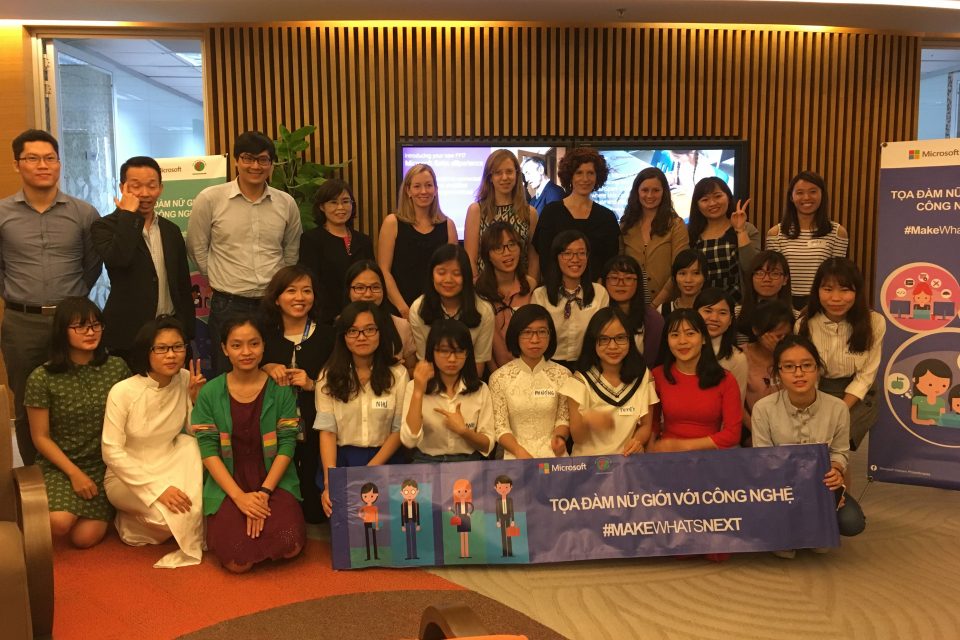 Daiana Beitler
Daiana Beitler
Philanthropies Director for Microsoft Asia
Daiana leads Microsoft’s philanthropies’ efforts in Asia, leveraging our assets as a company (technology, community investments, people and our voice) as a force for empowerment and inclusion. Her work spans youth engagement, natural disaster and human crises response, NGO capacity building, and accessibility. Daiana holds a PhD in Economic Sociology and a master’s degree in Social Policy and Development from the London School of Economics and writes about innovation policy and on the use of technology in government for peer-reviewed journals, and is a frequent speaker in academic conferences.
1. Tell us about your first job
My parents have a store back home in Montevideo, Uruguay, selling fabric and textiles. When I was in school, around the age of 8 or 9, I noticed that the people who came into the store to buy fabric, also needed buttons and zips. So, I put a little table in front of the store and sold buttons. And at that time, magnets were very popular. People had a lot of magnets on their fridge. I figured I could add a little bit more value and make even more money by pasting magnets at the back of buttons and making them colorful fridge magnets. As you can imagine, I had a lot of ice cream that summer! So that was my first ‘job’ where I made money.
My first official job was in the Uruguayan Foundation for Micro Credits where I sold credit in remote and low-income neighborhoods. Technically, it was my ‘second’ job because I was already volunteering at the same neighborhood in a soup kitchen, so I knew the people, the families, I knew the communities. It was interesting to get into this sort of microfinance space early. Coming from a middle-class family, and being in a job where people ask for $100 loans with a 200 percent interest rate for something that they desperately need like roof repairs, teaches you to have empathy and appreciate what you have been given.
2. Why Philanthropy?
There are two ways to answer this question: why Microsoft needs to do Philanthropy and why I have chosen this role. Interestingly, it is the same answer: because technology can be a huge force for good and through the work we do, we can create “shared value”, generating both social and economic returns. In other words, we can do good while doing well.
At Microsoft, this is our mission. It’s part of our DNA since Gates and Allen founded the company over 40 years ago. At the time, their vision was to democratize computing by putting a PC in every desk. Today, we are doing the same with AI. We are teaching workers AI skills and putting it in the hands of researchers and organizations working to benefit the 1 billion people with disabilities around the world, or solving environmental challenges, like the loss of biodiversity or climate change.
As a company, all of us at Microsoft are working towards creating a future where everyone has access to the benefits that technology provides and the opportunities it creates. Our team works on the “every person” part of the mission statement, focusing on those that the market doesn’t reach. I count my blessings every day because I have a job where I am having a direct and immediate impact on the lives of our young people, educators, entrepreneurs, and maybe even our future leaders.
3. What does leadership mean to you?
A good leader empowers others to do more, to be more, to achieve more. I truly think leadership is all about making others better and having impact that lasts after you’ve moved on.
There are many great leaders at Microsoft that I often learn from (too many to mention!), who work tirelessly to develop their teams’ capabilities, while showing empathy and earning their respect. I also had the fortune of working with an amazing woman leader early in my career and she was a great example of someone who has been able to balance her personal priorities (has three gorgeous children) with a demanding and fulfilling job.
I am trying to bring this type of leadership to my team. I am humbled and inspired by them every single day, and truly admire the knowledge, commitment and passion they bring to work. They tackle their sometimes-difficult jobs with incredible joy, resolve and enthusiasm. I am working with them on growing professionally, developing new skills and deepening their impact, both individually and as a team.
4. Who inspires you?
Through my work, I get to travel to interesting places and meet fascinating people across the region. Some live in really remote locations, others are part of ethnic minorities or indigenous communities. Many have disabilities. Despite their differences, they all have something in common: They have the courage to do something different, to try to learn new skills, to see it through, and come out stronger afterwards.
Let me tell you about Hai. He is from Vietnam and has cerebral palsy, so he can’t communicate verbally. He didn’t feel he had much of a future in his home town and didn’t want to be a burden on an already poor family in a fishing village. Instead, he made a name for himself. He became a web developer, and founded a non-profit that provides computer science training. He now makes three times the total income of his entire family – and he is 23 years old!
Just having the opportunity to hear their stories is incredibly inspirational; if they can do it, if they can have a growth mindset, and a great sense of resilience, we all absolutely can.





